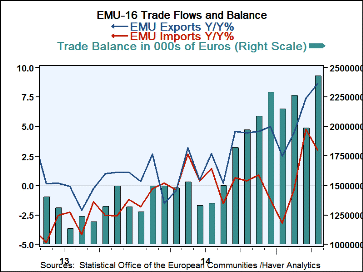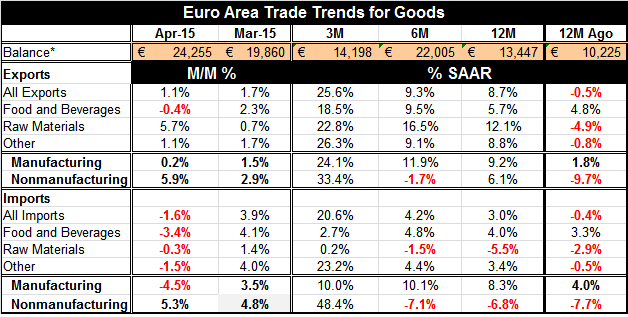 Global| Jun 15 2015
Global| Jun 15 2015EMU Trade Surplus Expands in April
Summary
EMU exports rose as imports fell in April, propelling the trade surplus to a gain over its March level. The surplus is now at a new high in this cycle. EMU exports are showing sequentially stronger growth rates with export growth over [...]
 EMU exports rose as imports fell in April, propelling the trade surplus to a gain over its March level. The surplus is now at a new high in this cycle. EMU exports are showing sequentially stronger growth rates with export growth over the last three months posting a huge 25.6% annual rate of gain. Both manufacturing and nonmanufacturing exports rose strongly over the last three months. Manufacturing exports had been gaining strength steadily before the three-month jump while nonmanufacturing exports made their three-month jump out of nowhere.
EMU exports rose as imports fell in April, propelling the trade surplus to a gain over its March level. The surplus is now at a new high in this cycle. EMU exports are showing sequentially stronger growth rates with export growth over the last three months posting a huge 25.6% annual rate of gain. Both manufacturing and nonmanufacturing exports rose strongly over the last three months. Manufacturing exports had been gaining strength steadily before the three-month jump while nonmanufacturing exports made their three-month jump out of nowhere.
On the import side, EMU flows have been lagging export growth, sequentially. But import growth had been stepping up before imports spurted over the last three months, growing at a 20.6% annual rate. Like for exports, the import flow of nonmanufacturers has been sluggish until the last three months when it soared at a 48.4% annual rate. Imports of manufactured goods have been steady near a 10% annualized growth rate over the sequential horizon.
If the manufactures data are more stable and reliable, there is a sign of an economic pick-up in these flows. But the spurt over the three months ended in April is not correlated with any other data pick up in the euro area. That spurt remains an anomaly.
Looking at country performance, German export growth is picking up from its year-over-year pace of 7.5%. France is picking up as well. The U.K. is seeing export growth pick up from its 4.2% year-over-year decline. Dutch exports growth rates, too, are back in the black after showing net declines over 12 months. Finland shows sharp declines in exports on all horizons. Portugal shows exports holding to strong rates of growth with year-over-year growth at 9.1%.
On balance, EMU members all show a sharp bulge in exports over three months. While the U.K. is in EU, it is not an EMU member, and its exports are tepid over three months.
With Greece hanging in the balance and looking like it really might default, the story of the euro area has never been more precarious. The Bundesbank took the opportunity to say that a strong euro would undermine growth in the region. Maybe it is worried that Greece might depart and that a euro without Greece will be stronger?

Robert Brusca
AuthorMore in Author Profile »Robert A. Brusca is Chief Economist of Fact and Opinion Economics, a consulting firm he founded in Manhattan. He has been an economist on Wall Street for over 25 years. He has visited central banking and large institutional clients in over 30 countries in his career as an economist. Mr. Brusca was a Divisional Research Chief at the Federal Reserve Bank of NY (Chief of the International Financial markets Division), a Fed Watcher at Irving Trust and Chief Economist at Nikko Securities International. He is widely quoted and appears in various media. Mr. Brusca holds an MA and Ph.D. in economics from Michigan State University and a BA in Economics from the University of Michigan. His research pursues his strong interests in non aligned policy economics as well as international economics. FAO Economics’ research targets investors to assist them in making better investment decisions in stocks, bonds and in a variety of international assets. The company does not manage money and has no conflicts in giving economic advice.
More Economy in Brief
 Global| Feb 05 2026
Global| Feb 05 2026Charts of the Week: Balanced Policy, Resilient Data and AI Narratives
by:Andrew Cates






